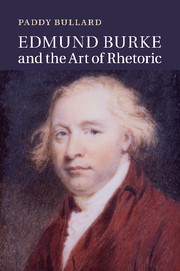Book contents
- Frontmatter
- Contents
- Acknowledgements
- Abbreviations
- Introduction: Burke, rhetoric and ethics
- 1 The ethical turn in early modern rhetoric, 1600–1760
- 2 Rhetoric in Ireland, 1693–1765
- 3 The Epicurean aesthetics of the Philosophical Enquiry
- 4 Episodes in the evolution of Burke's eloquence
- 5 Reflections on the Revolution in France and the rhetoric of character
- 6 Burke, Rousseau and the purchase of eloquence
- Conclusion
- Notes
- Bibliography
- Index
4 - Episodes in the evolution of Burke's eloquence
Published online by Cambridge University Press: 01 June 2011
- Frontmatter
- Contents
- Acknowledgements
- Abbreviations
- Introduction: Burke, rhetoric and ethics
- 1 The ethical turn in early modern rhetoric, 1600–1760
- 2 Rhetoric in Ireland, 1693–1765
- 3 The Epicurean aesthetics of the Philosophical Enquiry
- 4 Episodes in the evolution of Burke's eloquence
- 5 Reflections on the Revolution in France and the rhetoric of character
- 6 Burke, Rousseau and the purchase of eloquence
- Conclusion
- Notes
- Bibliography
- Index
Summary
This chapter describes how the ethical component in Burke's rhetoric develops and deepens in scope during his years as a member of the British Parliament. In the process, it offers the barest sketch of his career as an orator. But my real subject here, as ever, is the rhetorical principles that lie behind Burke's writings and speeches, in so far as they can be inferred from his occasional remarks on matters of state, on parliamentary process and on public morality. The practical business of politics has its place in this account as well. During his first five years as an MP the general purpose of Burke's rhetoric is to explain the party principles of the Rockinghamite Whigs, and to assert his own qualifications as a parliamentarian. In Thoughts on the Present Discontents the commonplace moral topic of friendship proves especially apt for this dual task, since it serves both to express his party's distinctive codes of prudent allegiance, and to make his own membership of that aristocratic ‘connexion’ seem natural. But if true politics is morality writ large, friendship can only magnify the virtues of private affection up to the relatively small scale of party organization.
As Burke immerses himself deeper in the study of trade and empire after 1770, he feels a growing need to express the exponential enlargement of Britain's interests during the previous half-century. He begins to stress how important it is that statesmen have the capacity of mind that will allow them to comprehend their enormous duties.
- Type
- Chapter
- Information
- Edmund Burke and the Art of Rhetoric , pp. 109 - 139Publisher: Cambridge University PressPrint publication year: 2011



